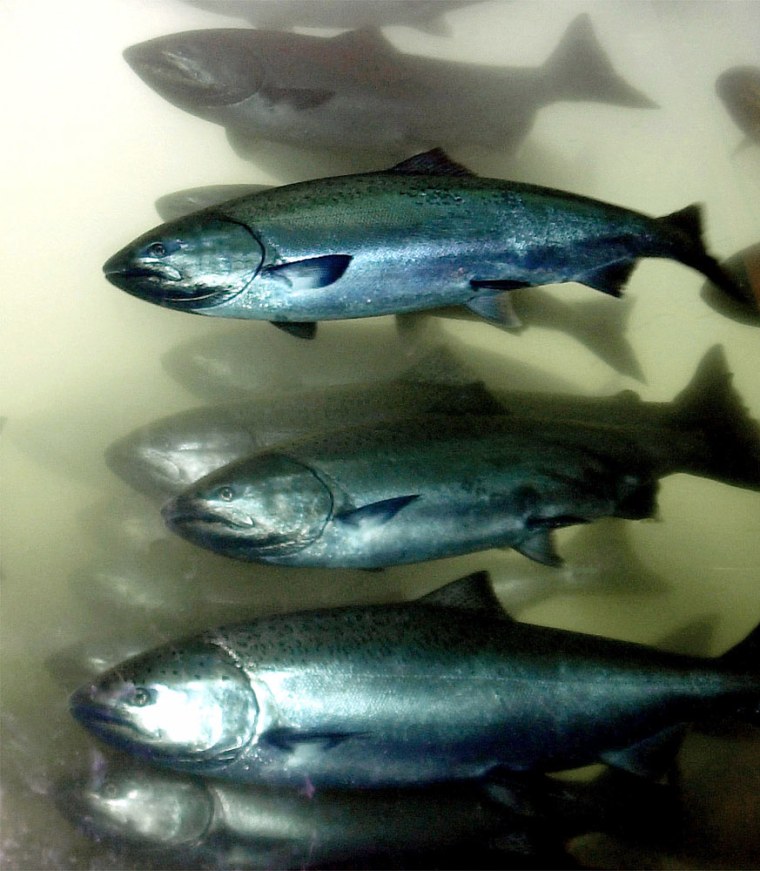Believing the Bush administration wrongly ignored their recommendations to protect Pacific salmon, six scientists have taken the rare step of issuing a public manifesto of sorts in the journal Science, warning that policies by the federal fisheries agency could wipe out wild salmon populations.
The scientists, who had earlier reviewed Pacific salmon recovery efforts for the National Marine Fisheries Service, said they were ignored when they advised the agency to clearly distinguish between wild and hatchery salmon, excluding the latter from population counts of wild fish.
"The group was told that their conclusions regarding endangered salmon populations and hatchery fish were inappropriate for their official reports because they went beyond science into policy," according to a press statement accompanying the Science article.
Fisheries Service spokesman Brian Gorman acknowledged that, saying the scientists had been asked only for a scientific assessment. "We have to make sure science stays science and doesn't enter into the policy arena," he told MSNBC.com.
Gorman said the issues raised were legitimate but needed to be raised in a different forum, such as the journal Science.
Judge revokes protection
The scientists' advice was in response to a federal judge's 2001 ruling that revoked endangered species protection for Oregon coast coho salmon. The judge said that if the Fisheries Service counted hatchery and wild salmon together, as it currently does, than both populations should be counted together when it comes to deciding if wild salmon merit protections.
Because hatchery salmon populations are now larger than wild salmon, protections would be harder to secure. Moreover, the scientists argued, including hatchery fish with wild salmon creates the legal possibility of maintaining a stock solely through hatcheries.
"This approach could have devastating consequences: Wild salmon could decline or go extinct while only hatchery fish persist," the six wrote in this week's Science magazine.
The scientists noted too that the Fisheries Service has been drafting criteria for including or excluding hatchery fish in a population, and has a March 31 deadline for their review of eight such salmon populations.
University of Washington ecologist Robert Paine, one of the six scientists, said the pressure on salmon comes down to logging and other development along coastlines and rivers. "Pacific salmon are under threat of being eliminated to make way for development," he said in the press statement. "We should not open the legal door to maintaining salmon only in hatcheries. The science is clear and unambiguous; as they are currently operated, hatcheries and hatchery fish cannot protect wild stocks."
Hatchery vs. wild
In their commentary in Science, the experts noted that hatchery salmon could overwhelm wild salmon by their sheer numbers and the fact that they typically are larger than wild salmon, giving them an advantage when it comes to breeding. But "hatchery fish usually have poor survival in the wild," they wrote, and have lost the keen sense that wild salmon have of being able to return upriver to the area where they first spawned.
"The current political and legal wrangling is a side show to the real issues. We know biologically that hatchery supplements are no substitute for wild fish." Paine added. "It's time NMFS protected our national legacy, in a legally-defensible manner. Foot-dragging, and the resultant delays, by NMFS's policy makers are pushing these cultural icons of the Pacific Northwest toward extinction."
Ransom Myers, another of the six and a fisheries biologist at Dalhousie University in Canada, noted that even decades of hatcheries don't help. "One hundred years of hatcheries have not brought back wild Atlantic salmon to Maine," he stated.
"Once we lose the wild populations of salmon and the natural habitats that support them, we will never get them back," he said in the press statement. "The critical legal issue is what counts as a fish when one is trying to conserve a population. In particular, salmon in hatcheries undergo very rapid genetic and behavioral changes. After very few generations, these hatchery fish find it difficult to survive in the wild."
